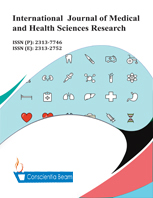Knowledge and Utilization of E-Health Care Delivery among Health Care Professionals in Federal Teaching Hospital Abakaliki, Ebonyi State, Nigeria
DOI:
https://doi.org/10.18488/journal.9.2020.71.19.30Abstract
The high burden of emerging and re-emerging infectious diseases in Nigeria underscores the need for electronic health. This study determined the knowledge and utilization of e-Health care delivery among health care professionals in federal teaching hospital Abakaliki (FETHA) Ebonyi State. A self-developed questionnaire was used for the study. Two specific objectives with four null –hypotheses were postulated to guide the study. Out of a population of 2092 health workers in FETHA, 209 representing 10% were drawn through a multistage sampling technique and were studied. Frequency and percentage were used to answer research question one, Mean statistic was used to answer research questions two, Analysis of Variance (ANOVA) was used in testing null-hypotheses one and two while Binomial Logistics Regression was used in testing hypotheses three and four at .05 level of significance and appropriate degree of freedom. The findings indicated that health care professionals in FETHA possessed good knowledge of e-Health care delivery with an overall per cent (85.6%). The findings further show that utilization of e-Health care delivery was low (x̅= 2.14). The four null-hypotheses tested shows that there is no statistical significant difference in level of knowledge by age (P=.236 >0.05), level of utilization by age (P-value =.087>0.05), level of knowledge by gender (P-value=.051>0.05), level of utilization by gender (P-value = .908>0.05). The study concluded among others that Nigerian government at all level, through their various ministries of health should organize intensive ICT training and retraining of health workers regarding e-Health use in health care delivery.

